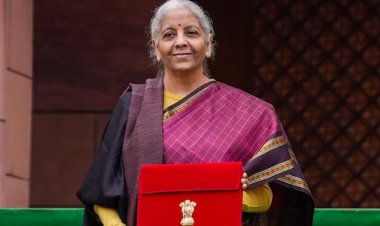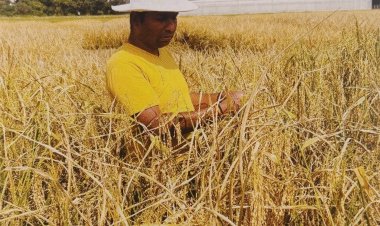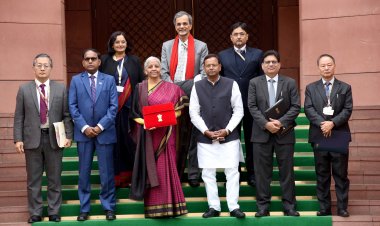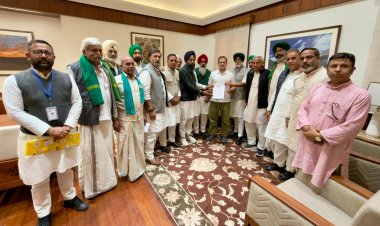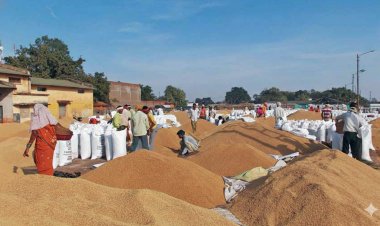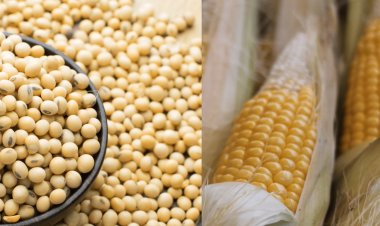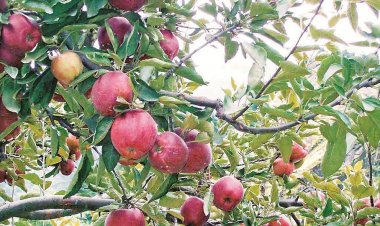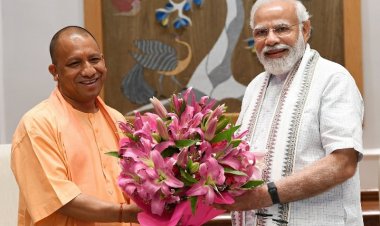Duty on onion exports leaves pungent taste with onion growers, traders
India is a democracy and elections have to be won to stay in power. People want cheap food to eat. When inflation occurs, opposition parties get an opportunity to defame the government in power. As the rulers do not want this, some decisions are taken before the uproar starts. Governments have fallen when onions become expensive. Governments have never fallen because onions became cheap. If the farmers get organised on the issue of onion, the incoming government will think ten times before taking anti-farming decisions.
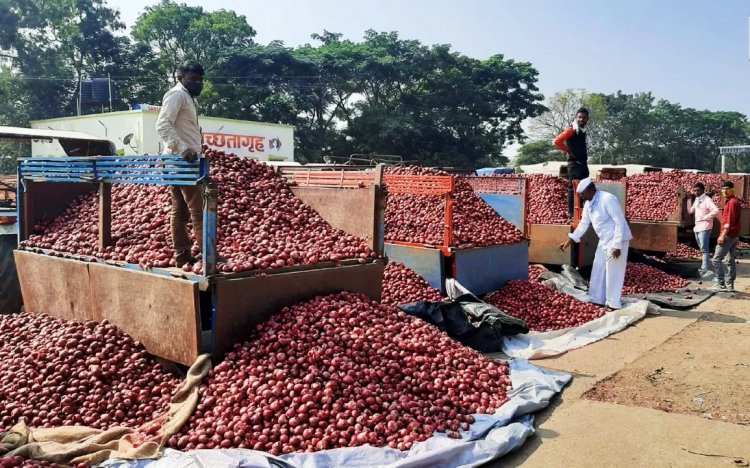
The Central government has levied 40 per cent export duty on onion, triggering protests by onion producers and traders in Maharashtra. Traders stopped onion auction in the markets and farmers blocked the roads as part of their agitation. After about two to three years, onion farmers had started getting affordable prices for their onions. This year onion crop was damaged due to heavy rains. A huge quantity of onions was no longer storable and had to be sold at low prices.
Onion prices started collapsing as the government hastily hiked export duty when stored stocks were expected to fetch better prices. Onion, which was selling above Rs 2500/- to Rs 3000/- per quintal fell to Rs 1700/- to Rs 1800/- per quintal. Dissatisfaction among the farmers was inevitable. Many duties and dreams of the farmers such as debt repayment, daughter's marriage, children's education, home work was to be completed on this onion crop, collapsed. Agricultural lands of thousands of farmers in Nashik district are on the verge of being auctioned for loan recovery. This is happening due to consumer biased and exploitative policy of the Indian government.
India is the largest onion exporting country in the world which means many countries depend on India for onion supply. India has several times imposed similar sudden export bans, declared minimum export values or levied export duties to control domestic onion prices. Due to such decisions, export traders cannot fulfil their previous commitments. Onion vehicles sent for export at the port or at the country's border get stuck, the onion in transit rots and the cost increases enormously.
Onion has to be sent in refrigerated (air-conditioned) containers, which means the cost of electricity to keep the container cool at the port increases, which is Rs 5,000-6,000 per day. Besides, Rs 10,000 extra has to be paid every day for the truck as it has to stay idle for days. This time the traders sent onion by paying 40% export tax from their own pockets. Yet, 800 tonnes of onion have been damaged at the port while waiting for permit to load the consignment. This means that the traders will recover the huge financial losses by paying lower prices to the farmers. Farmers will have to suffer at the end of the day.
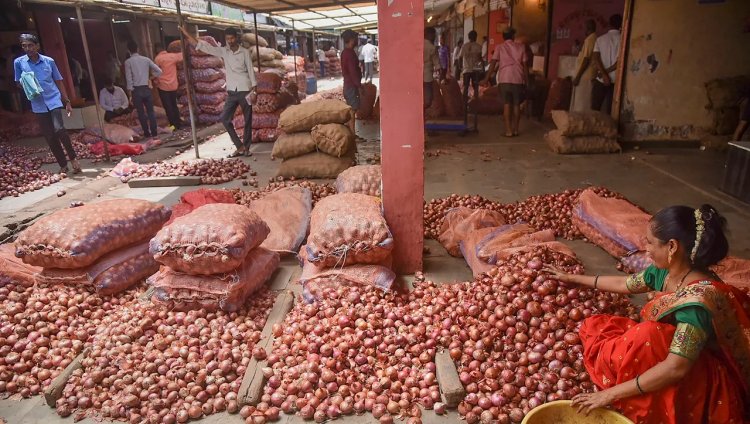
On the day when the increase in export duty was announced, onion was available to the end consumer at Rs 35/- per kg in Pune. This rate is not expensive. But the government must have panicked because of the "after tomato, onion will make the common people cry" propaganda started in the media, prompting the government to take this decision.
While working on the Supreme Court-appointed committee on the new farm laws 2020, looking at onion statistics, it was noticed that only 29.60% of the amount paid by consumers for a kg of onion reaches the farmers. Onion was excluded from the list of essential commodities in the new Agriculture Act. But there was a clause in it that if the price of onion increased by 100%, onion would be included in the list of essential commodities again and all restrictions would be reimposed.
There was a provision that the average price of the retail sale price of onion for the last five years will be taken into account to calculate this rate increase. When the officials of the Ministry of Food and Consumer Affairs came to discuss with our committee, I asked what is the average selling price of onions for the last five years? They said Rs.25/- per kg. The farmer will get 30% of this which means eight rupees!!
Production cost of onion is Rs.20/-. As per the provisions of the new Act, 100% increase i.e. if the rate is Rs 50/- then again export ban, limit on stocks, MEP, export duty, import etc.
While the consumer pays Rs 50/- to consume onion, the farmer gets only Rs 16/-. This is not enough to cover production cost. Our committee has recommended permanent removal of onion from the Essential Commodities Act and if it is to be retained, re-introduce it only if the retail rate increases by 200%. But unfortunately for the farmers, the government did not pay attention to our recommendation and the laws were withdrawn.

Maharashtra Deputy Chief Minister Devendra Fadnavis, who went to Japan, had to take steps to save the image of the party as soon as the agitation started in Maharashtra to remove the onion export duty. Before he reached Delhi, he contacted Union Minister Piyush Goyal from Japan and decided to purchase onions through NAFED at the rate of Rs 2,410/- per quintal. A message was sent from Japan to Delhi within a minute, but even after a week, the order to procure onions did not reach Nashik from Delhi. Onion procurement has not started yet, but prices have fallen by Rs 700-800 and the possibility of further decline cannot be ruled out.
The logic behind setting the price of Rs 2,410/- per quintal by the central government is not known especially while there is a possibility of getting a price of Rs 30/- to 35/- in the open market for the onion producer. But a discreet message has gone to the traders that they should not buy onion higher than this rate. There was no reason for the government to announce the purchase price now. If the government wants to provide cheap onion to the people, the government should have gone to the open market and bought the onion at the prevailing price. Then it should be sold at a price that the needy can afford.
It is clear that this ploy is only to bring down onion prices. If the government calls this the MSP of onion, then when onion sells at thr rate of Rs 500 per quintal, it should be purchased through NAFED at the same rate of 2410/- per qtl. When rates fall, the government procures onion at the prevailing rate in the open market. There is a huge scam in onion procurement through NAFED. What other reason could there be for keeping the onion procurement information by Nafed a top secret? The government has not stopped at just levying export duty but has allowed traders to import onion from Afghanistan. But due to the loss to the traders in importing onion, there was no large amount of import.
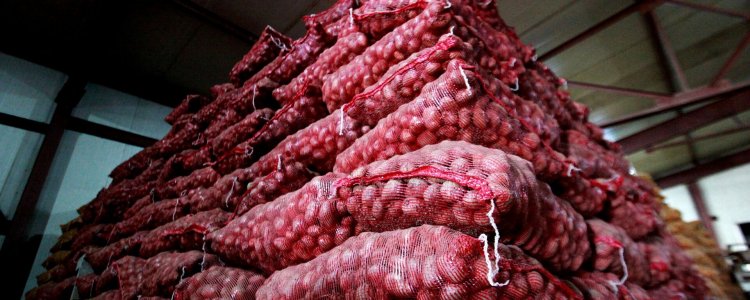
Onion is exported to many countries from India. At one time, India's share of the world onion market was almost 40 per cent. Many countries have turned their backs on India due to the government's policy of restricting onion exports suddenly and now India's share has dropped to just eight per cent. Bangladesh was importing 26% of the total onion exported. When India imposed a sudden export ban in October, 2020, the Prime Minister of Bangladesh requested the release of vehicles transporting onions at the border, but it was flatly refused. Then they imported onion seeds from India instead of onions and encouraged their farmers to grow onions.
This time Bangladesh has decided to import onion from nine other countries due to sudden restriction of export duty again. This means we will lose a major importing country forever. In the past, when the export ban was imposed, Japan and the US had complained about India's trade policy in the World Trade Organisation. Any country needs to earn foreign currency to improve its economy. Are we not going to get dollars even by exporting onions? Today there are restrictions on all agricultural products that India can export, not just onions. Export ban on rice, wheat, sugar, oilseeds, some pulses. Innumerable imports are also being made and this every decision is killing the farmers and will end India's credibility in the international market.
India is a democracy and elections have to be won to stay in power. People want cheap food to eat. When inflation occurs, opposition parties get an opportunity to defame the government in power. As the rulers do not want this, some decisions are taken before the uproar starts. Governments have fallen when onions become expensive. Governments have never fallen because onions became cheap. If the farmers get organised and overthrow the government on the issue of onion, the incoming government will think ten times before taking anti-farming decisions.
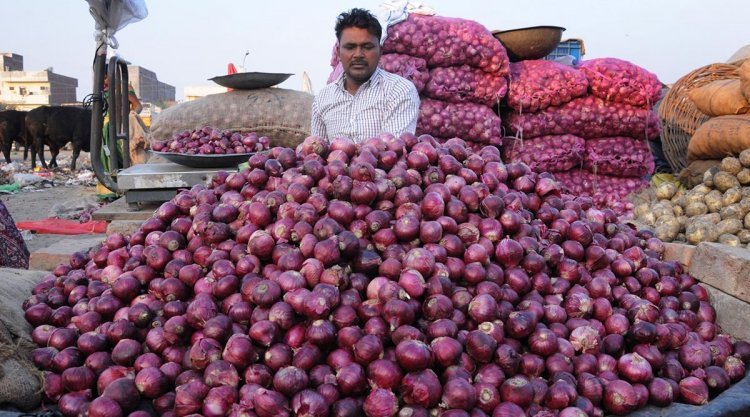
Indian Onions have a good demand all over the world due to its distinctive taste. Taking advantage of this, there should be a long-term policy regarding import and export of all agricultural products along with onion. position India in the This will help India gain stability in the international market. If the government wants to impose any restrictions on export or stock limits, if there are signs of domestic shortages, the government should at least do the following:
1) At least one and a half to two months in advance, notice should be given to the concerned countries, traders and farmers in this regard. The practice of immediate enforcement should be stopped forever.
2) Govt should stop interference in onion trade forever if possible. If the price of onion increases by more than 200%, then only government should intervene, if necessary.
3) A reliable system for collecting information about onion cultivation and production should be established and that information should be made easily available to traders and farmers.
4) Encouragement and funding should be made available for research in onion storage technology.
5) There is a need to use updated technology to process and store onion. Encouraging the people to consume dehydrated onion or sliced and frozen onion. Foreign investment should be welcomed for processing industry and necessary facilities should be made available to this industry. In times of scarcity, this processed onion can be used and inflation can be kept under control without hurting farmers.
Just stopping government intervention in the onion trade can make a big difference. For this, the parties implementing the policy of controlling prices of agricultural commodities should step down from power and the power should be given to the party which guarantees no intervention in the agricultural commodity trade.
(Anil Ghanwat is President of the Swatantra Bharat Party, the political wing of the farmer group Shetkari Sanghatna. Opinions expressed by the author are his personal views.)



 Join the RuralVoice whatsapp group
Join the RuralVoice whatsapp group


















